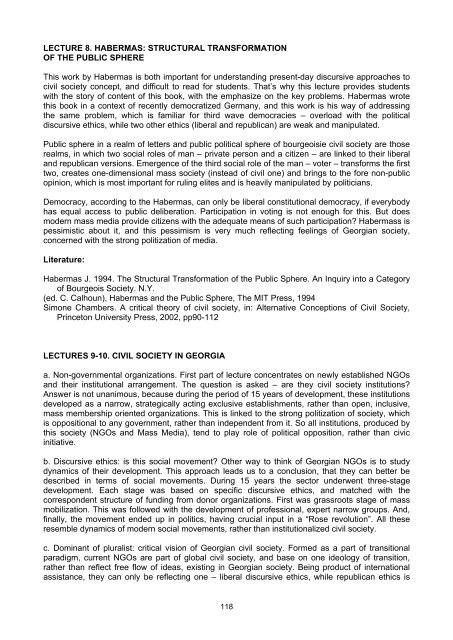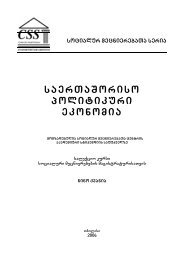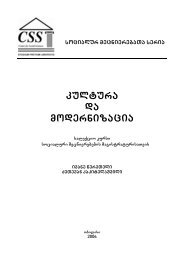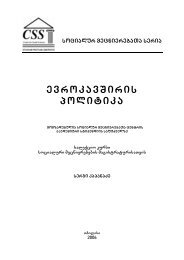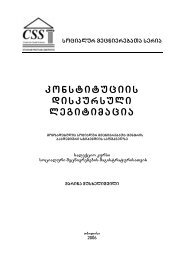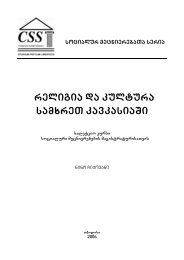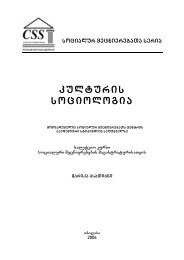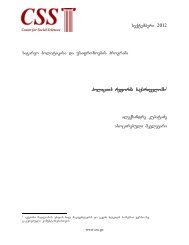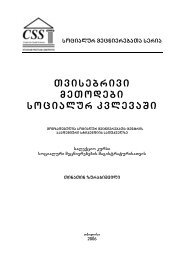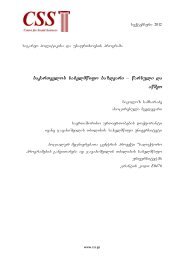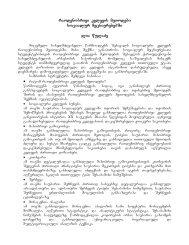samoqalaqo sazogadoeba - Center for Social Sciences
samoqalaqo sazogadoeba - Center for Social Sciences
samoqalaqo sazogadoeba - Center for Social Sciences
Create successful ePaper yourself
Turn your PDF publications into a flip-book with our unique Google optimized e-Paper software.
LECTURE 8. HABERMAS: STRUCTURAL TRANSFORMATION<br />
OF THE PUBLIC SPHERE<br />
This work by Habermas is both important <strong>for</strong> understanding present-day discursive approaches to<br />
civil society concept, and difficult to read <strong>for</strong> students. That’s why this lecture provides students<br />
with the story of content of this book, with the emphasize on the key problems. Habermas wrote<br />
this book in a context of recently democratized Germany, and this work is his way of addressing<br />
the same problem, which is familiar <strong>for</strong> third wave democracies – overload with the political<br />
discursive ethics, while two other ethics (liberal and republican) are weak and manipulated.<br />
Public sphere in a realm of letters and public political sphere of bourgeoisie civil society are those<br />
realms, in which two social roles of man – private person and a citizen – are linked to their liberal<br />
and republican versions. Emergence of the third social role of the man – voter – trans<strong>for</strong>ms the first<br />
two, creates one-dimensional mass society (instead of civil one) and brings to the <strong>for</strong>e non-public<br />
opinion, which is most important <strong>for</strong> ruling elites and is heavily manipulated by politicians.<br />
Democracy, according to the Habermas, can only be liberal constitutional democracy, if everybody<br />
has equal access to public deliberation. Participation in voting is not enough <strong>for</strong> this. But does<br />
modern mass media provide citizens with the adequate means of such participation? Habermass is<br />
pessimistic about it, and this pessimism is very much reflecting feelings of Georgian society,<br />
concerned with the strong politization of media.<br />
Literature:<br />
Habermas J. 1994. The Structural Trans<strong>for</strong>mation of the Public Sphere. An Inquiry into a Category<br />
of Bourgeois Society. N.Y.<br />
(ed. C. Calhoun), Habermas and the Public Sphere, The MIT Press, 1994<br />
Simone Chambers. A critical theory of civil society, in: Alternative Conceptions of Civil Society,<br />
Princeton University Press, 2002, pp90-112<br />
LECTURES 9-10. CIVIL SOCIETY IN GEORGIA<br />
a. Non-governmental organizations. First part of lecture concentrates on newly established NGOs<br />
and their institutional arrangement. The question is asked – are they civil society institutions?<br />
Answer is not unanimous, because during the period of 15 years of development, these institutions<br />
developed as a narrow, strategically acting exclusive establishments, rather than open, inclusive,<br />
mass membership oriented organizations. This is linked to the strong politization of society, which<br />
is oppositional to any government, rather than independent from it. So all institutions, produced by<br />
this society (NGOs and Mass Media), tend to play role of political opposition, rather than civic<br />
initiative.<br />
b. Discursive ethics: is this social movement? Other way to think of Georgian NGOs is to study<br />
dynamics of their development. This approach leads us to a conclusion, that they can better be<br />
described in terms of social movements. During 15 years the sector underwent three-stage<br />
development. Each stage was based on specific discursive ethics, and matched with the<br />
correspondent structure of funding from donor organizations. First was grassroots stage of mass<br />
mobilization. This was followed with the development of professional, expert narrow groups. And,<br />
finally, the movement ended up in politics, having crucial input in a “Rose revolution”. All these<br />
resemble dynamics of modern social movements, rather than institutionalized civil society.<br />
c. Dominant of pluralist: critical vision of Georgian civil society. Formed as a part of transitional<br />
paradigm, current NGOs are part of global civil society, and base on one ideology of transition,<br />
rather than reflect free flow of ideas, existing in Georgian society. Being product of international<br />
assistance, they can only be reflecting one – liberal discursive ethics, while republican ethics is<br />
118


